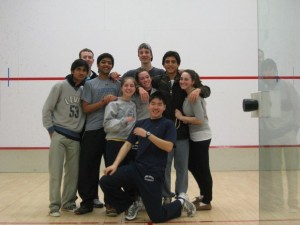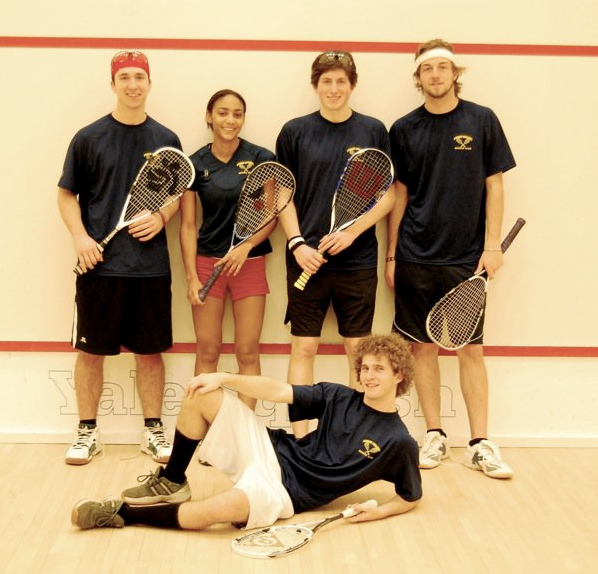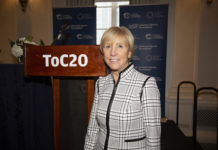By Jennifer Gabler
The explosion in the number of college squash programs across the nation is quite well known. This proliferation of squash opportunities has helped attract more new players, especially women to the sport. Initially, many of the club or emerging teams play as a single squad with men and women combined so they have a critical mass to field a team. Many combined teams then transition fairly quickly to separate women’s and men’s squads. The number of women’s only teams is exploding and five emerging teams competed in February in the women’s national championships at Yale—Bucknell, Cal Berkeley, Johns Hopkins, Vermont and Vanderbilt. The other exciting aspect of these developing programs is that in many cases they have created a hub for squash in a geographic area that is new to squash. The College Squash Association (CSA) and Shona Kerr, the president of its Women’s Committee, has been instrumental in helping students get programs launched and supporting teams so they can attend national championships.
Two junior players in Nancy Cushman’s Meadow Mill Athletic Club squash programs left Baltimore to go to colleges where there were no previously established programs. Based on their love of the game and desire to spread that enthusiasm, several new college programs are now in existence. Brad Kolodner started Ithaca College’s program and Griffin Snyder started Bucknell University’s program. Peter Heffernan, the head pro at Meadow Mill, has also been instrumental in re-starting the Johns Hopkins college squash program. Peter also noted that several Meadow Mill junior players are now playing on other emerging teams, Notre Dame and Tulane, and that Meadow Mill is also trying to start club teams at local colleges (Loyola, Towson and University of Baltimore). Outside the Meadow Mill group, but also very exciting, is the work that Helen Whelan has been doing to create a new women’s squash team at Boston College.

Ithaca College
Brad Kolodner played squash in his last two years of high school but did not give much weight to playing in college. However, when he got to Ithaca College he missed the game. He and Leisa Robotham, another Ithaca student with squash experience, set up a table at the fall student organization fair and 40 people signed up interested in playing. A regular crew of 17 players has shown up twice a week to play at the courts at nearby Cornell. Six of the 17 had played before, 11 were beginners. Brad and Leisa worked together to attract the players, organize the court time, locate a faculty adviser (Bill Austin, the head men’s and women’s tennis coach at Ithaca who had coached women’s squash at Hamilton), arrange a schedule of matches (they have played Sienna and Hamilton in dual matches) and enter a five-person team in the emerging teams bracket of the CSA nationals. They also secured a grant from the CSA to help defray the team’s entry fee into the CSA Championship and Craig Dawson from Navy helped to get the Ithaca team nationals ready. Two of their top five were women. Ithaca finished third in the emerging teams division of the CSA tournament, competing against Siena, Tulane, University of Illinois at Springfield and Johns Hopkins.
The interesting thing about these newly formed programs is the spirit behind them. The driving forces behind these programs are creating an activity where people can meet other students, get exercise and just get out there and play. With many lacking coaches, the experienced team members teach the beginners, fostering a supportive and encouraging environment. There is great camaraderie among the team which is not focused on winning but instead on just competing. The Ithaca College club team had their first match against the Cornell club team in early February. Kolodner was the only winner in Ithaca’s 8-1 defeat, but he said, “Winner or losing had no bearing about how I feel about this club. For me, it is about putting all the work into getting the club started and actually having the first match in the college’s history, which was exciting.”
Leisa Robotham, the co-founder of the of the Ithaca team, has played squash for 10 years and played for three years as part of the Jamaican Junior National Team that competed in the annual all-Caribbean tournament. Robotham feels that “it is important to show the players at Ithaca and other emerging teams that this is not just a “guys sport” and that women can compete, win and contribute to the team just as much as men.” Starting the Ithaca club was important to Robotham as she was injured her senior year and could not be recruited to an established college squash program. She says they are lucky to have beginners who are athletic on their squad. She and the other experienced players have helped the beginners with their strokes and strategy. About the squad’s first year, she reiterated, “It’s not about winning; it’s about gaining experience and exposure”
Kolodner feels “that the squash world is a small one so it is important to spread the word about squash to those who have never seen or played the game. I’ve gotten a lot of personal fulfillment from helping teach others and building a brand new sport for my college which I hope will someday grow into a men’s and women’s varsity program.” With Ithaca being part of the CSA (and on their website) and the club being promoted as part of Ithaca’s athletic program, several prospective freshmen have already contacted him about coming next year which will help develop the program next year.

Johns Hopkins
Johns Hopkins University (JHU) had a women’s team years ago that competed in the then Division 3 and 4 category. Unfortunately coaches were difficult to come by and interest waned. This past season Meadow Mill Athletic Club’s (MMAC) head squash pro, Peter Heffernan, took it upon himself to renew interest in squash at JHU. Hefernan was confident that if he offered to restart their collegiate teams then JHU might be willing to donate court time to Baltimore Squash Wise (BSW), as MMAC had no more courts to dedicate to the growing urban program. MMAC hosts so many area school programs that it just “ran out of courts” for the growing urban program. Also, many of the successful urban programs align themselves with a university for the support that can be provided through volunteers, tutors, facilities and technology.
There were also many connections between MMAC and JHU which further reinforced the partnership. Abby Markoe, who heads BSW, is currently a graduate student at JHU and Nancy Cushman, owner of MMAC, earned her Masters in Education from Hopkins and coached the Hopkins women’s teams in pre-MMAC days.
The result is that squash is growing at JHU. Many JHU volunteers have come forward to help with BSW and the JHU teams have very quickly developed into competitive players. Steve Peever has acted as the assistant coach. Peever is a nationally ranked squash player at Cornell who is spending his fourth undergraduate year as a visiting student at Hopkins. Sasha Guttentag, the women’s team captain, has been the driving player/organizer for both the men’s and women’s teams. She put grant requests together so that both teams received CSA funding to attend nationals. She helped to organize ladders and worked with the Hopkins football coach to get uniforms for the teams.
The men’s team ended up No. 2 in the emerging team collegiate championships, losing to Tulane 3-2. The women’s team did not place anywhere but they played a lot of squash and had great fun. Guttentag has made it her goal to get varsity status for the women’s team by the time she graduates.
“I helped to start the team so we could compete against other colleges and draw new players to the sport,” said Guttentag. She is happy with the progress they have made but knows they have a long way to go to achieve varsity status. “It was an amazing experience to go to nationals and play girls from all over the country. No one on our team had played at a tournament of that level before.”
Next issue, we will take a closer look at Bucknell, Boston College, and gain some perspective on the CSA from Shona Kerr.





